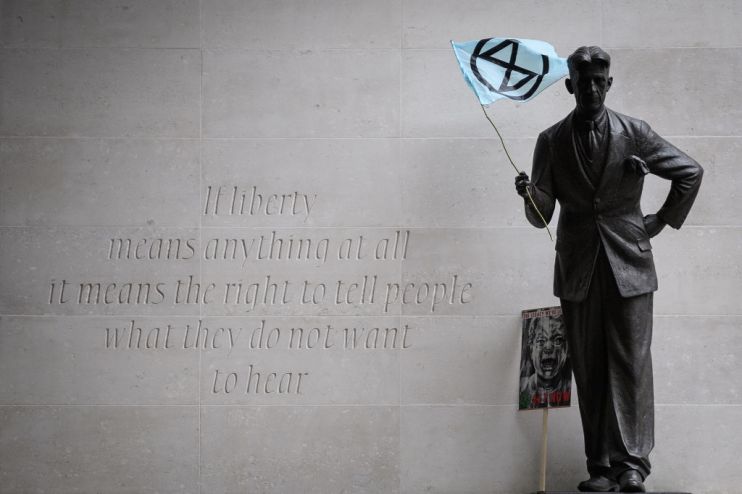By restricting free speech, we risk sleepwalking towards a tyranny worthy of Orwell

In an unpublished preface to Animal Farm, discovered amongst the author’s papers in 1972, George Orwell argued that: “If liberty means anything at all it means the right to tell people what they do not want to hear.”
In the last two weeks, we have twice been given reason to question what our liberty is now worth.
Last week, students at Oxford University, once a bastion of free speech and independent thought, chose to “no-platform” Amber Rudd, the former home secretary. Rather than hear from someone whose politics they opposed, the audience at an event where Rudd was due to speak cancelled her talk just half an hour before she was due to take the stage.
The event was a celebration of International Women’s Day, and Rudd was due to deliver an apolitical address encouraging women into a career in politics. But that didn’t seem to matter. Rudd’s political opinions — comfortably within the mainstream, but not of the left — were deemed too offensive to warrant her a voice.
This is the new reality of the self-righteous left, who have determined that those they disagree with must be silenced rather than debated.
This week, it was the turn of Trevor Phillips, the former chair of the Equalities and Human Rights Commission. On Monday, Phillips was suspended by the Labour party, accused of Islamophobia — a term, ironically, popularised by Phillips himself.
His real crime appears to have been to engage with challenging questions of race, faith and multiculturalism in modern British society. In his 2016 essay “Race and Faith: The Deafening Silence”, Phillips drew attention to precisely what he has now fallen victim to: the unwillingness of the left to engage with difficult questions for fear of causing offence.
You might reasonably disagree with what Phillips goes on to say, in this essay and elsewhere, about the challenges of multicultural Britain. But if we are to engage with the great issues that define our society, we must be willing to debate them too.
Instead, the forum for serious public debate is narrowing, replaced by a troubling desire to limit ourselves to the comfort of an echo chamber. It is an instinct that has come to define the Corbyn era, a period in which the far left has failed to convince even moderate left-wingers, let alone the public at large, of its arguments — and so has ceded power to the right, perhaps for the next decade.
Democracy and progress rely on the free exchange of opposing ideas. Debate allows us to test and refine our views, in contact with those of our opponents. In doing so, we have the opportunity to persuade them of our arguments, and perhaps be persuaded of theirs.
By refusing to engage with an opponent, we risk ceding the argument to them. The most obvious result of no-platforming on American campuses, where this sorry movement began, is the credibility it has lent to those who have been silenced. Where open debate might have exposed a fool, silence has created a martyr.
John Stuart Mill believed that “social tyranny” would constrain free speech long before any autocrat did. Those who seek to silence the views of those they oppose may believe they are standing up to tyranny. Little do they realise that they are its handmaidens.
By restricting free expression, we are sleepwalking towards a tyranny worthy of Orwell’s imagination.
Main image credit: Getty